Can chickens eat honey? Chickens are omnivores, meaning they eat almost anything. This includes honey. Chickens love sweet things, and honey is a great way to give them a little treat.
While eating honey is not harmful to chickens, there are a few things to consider before you start feeding your chickens this sticky treat.
This article will cover everything you need to know about feeding chickens honey, including the benefits and things to watch out for.
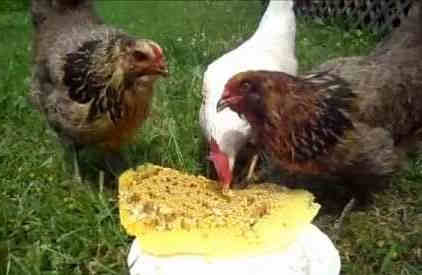
Can chickens eat honey?
The answer is yes; chickens can eat honey. Honey is an excellent source of energy for chickens. It is also packed with vitamins and minerals that can help boost your chicken’s immune system. Honey can also help with digestive issues. Chickens love the taste of honey and will often ask for more.
Some people believe that honey is bad for chickens because it contains sugar. However, sugar is not the only ingredient in honey. Enzymes, amino acids, and other nutrients are beneficial to chickens. So, while sugar may not be suitable for chickens in large quantities, honey is relatively healthy.
[ChickenAffiliate]
The benefits of eating honey for chickens
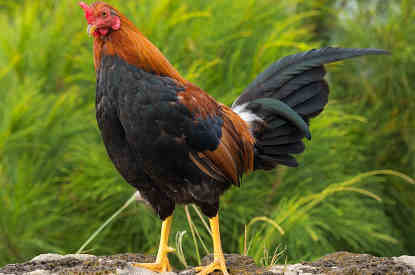
Honey can be incredibly good for your chickens. Here are five ways that honey can improve your chickens’ health.
Boosts immunity
Honey is rich in antioxidants, which can help boost your chickens’ immune systems. This is especially important during the colder months when your chickens are more susceptible to getting sick. Adding honey to their diet will help them fight off any potential sicknesses.
Clears up respiratory issues
Breathing problems are common in chickens, but honey can help clear their respiratory passages. Honey has anti-inflammatory and antibacterial properties, which can help relieve any congestion or inflammation in the respiratory system.
Heals wounds and sores
Honey is a natural antiseptic, so you can use it to heal wounds and sores. Apply honey to the affected area and let it work its magic. The honey will help kill bacteria in the wound and speed up healing.
Reduces inflammation
Chickens often suffer from inflammation, particularly in their joints. Honey can help reduce this inflammation and improve joint health. The anti-inflammatory properties of honey will help reduce swelling and pain in the joints.
Increases energy levels
Honey is a natural energy source that can help increase your chickens’ energy levels. This is especially important for older chickens or those that are molting. The extra energy from the honey will help them get through these difficult times.
Like humans, our feathered friends need a balanced diet to stay healthy and happy. You’ll be doing them a big favor by adding honey to their diet. Not only will they enjoy the sweet taste of honey, but they’ll also reap all of the benefits mentioned above.
Things to watch out for when feeding honey to chickens
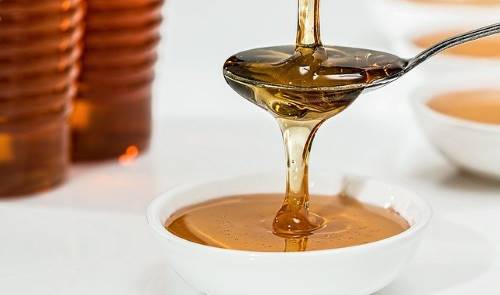
There are a few things you should keep in mind when feeding honey to your feathered friends.
Make sure the honey is raw and unprocessed
When feeding honey to chickens, you want to make sure that the honey is raw and unprocessed. This means that the honey has not been heated or filtered and still contains all of the pollen, enzymes, and vitamins found in nature. Raw honey is more likely to contain these beneficial nutrients than processed honey.
Avoid giving too much honey at once
Chickens can eat honey but should not eat too much of it at once. A good rule of thumb is to give no more than 1 teaspoon of honey per chicken per day. Any more than this could cause digestive problems for your chickens.
Be aware of beeswax content in the honey
Beeswax is not toxic to chickens, but if they eat too much of it, they may experience digestive issues. Check the label for beeswax content if you are feeding your chickens store-bought honey. You can also ask the beekeeper if you get your honey from a local source.
Honey attracts rodents and other pests
Chickens are attracted to the sweet smell of honey, which will attract rodents and other pests to your coop. These pests can not only steal your chicken’s food but also spread disease. To keep your coop pest-free, it’s best only to feed honey to your chickens in small quantities.
How often should chickens eat honey?
The answer to this question may surprise you, but there is no one-size-fits-all answer. It depends on the specific needs of your flock.
For example, if your chickens are dealing with a health issue, you may need to increase the amount of honey they eat. If they are healthy and just starting a honey diet, you can start once a week and adjust as needed.
Remember that honey should never make up more than 10% of your chicken’s diet. The rest of their diet should consist of a balanced diet of grains, vegetables, and proteins.
Honey is an excellent supplement to their diet, but it should not be the only thing they eat. Chickens are like people; they need a balance of different nutrients to stay healthy.
How to prepare the honey for feeding to chickens
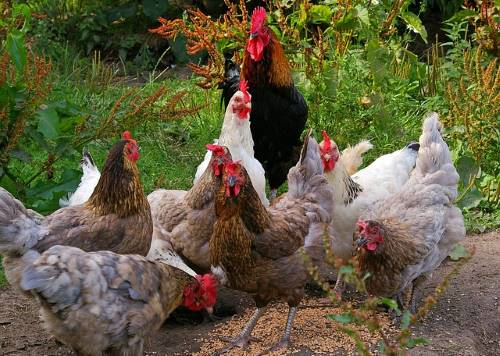
If you’ve decided that you want to feed your chickens honey, there are a few things you need to do first. Start by mixing the honey with some warm water. This will make it easier for the chickens to eat and digest.
Next, add the honey-water mixture to your chicken’s food or water bowl. You’ll need to do this every day if you want your chicken to get the full benefits of the honey.
Can baby chicks eat honey?
It’s a common question that many new chicken owners ask – can baby chickens eat honey? The answer, in short, is yes! Honey is not only safe for baby chicks, but it also has many benefits.
Honey contains several vitamins and minerals essential for chick development, including vitamins A, B, and C, as well as iron and calcium. Honey also has antibacterial and antifungal properties, which can help keep your chicks healthy.
In addition to the nutrients that honey contains, feeding honey to your chicks can also help them develop a strong immune system. When bees collect nectar from flowers to make honey, they also pick up pollen. This pollen contains enzymes and proteins that can help stimulate the immune system.
When feeding honey to baby chicks, it’s essential to use raw, unfiltered honey. Commercial honey is often heated during the processing stage, destroying many beneficial nutrients that make raw honey so good for chicks.
You’ll also want to avoid giving your chicks sugar water or corn syrup, as these can lead to health problems down the road.
To feed your chicks honey, add a few drops to their water bowl or sprinkle it on their food. You can also soak their food in a mixture of water and honey before giving it to them.
Start with a small amount and increase the amount you give them as they get older and can handle more.
Other Snack Foods for Chickens Apart From Honey
Honey is a popular treat that many chicken keepers give to their flocks. The sweet flavor and nutritional benefits of honey make it an excellent choice. But what about other human snack foods? Can chickens also eat those? Let’s examine some common snack foods and see how they might affect our feathered friends.
Popcorn
Believe it or not, chickens love popcorn! It’s a healthy and fun snack for them when it’s air-popped and unsalted. Popcorn contains dietary fiber and some essential nutrients. However, do remember to ensure that all the kernels are fully popped, as unpopped or partially popped kernels can be a choking hazard for chickens.
Read More: Can Chickens Eat Popcorn? Fun Facts And Feeding Tips
Raisins
Raisins are dried grapes and can be another great treat for chickens. They contain essential nutrients and are high in sugar, providing a quick source of energy. However, due to their high sugar content, they should be given sparingly and not as a major part of their diet. Chickens can have trouble digesting large amounts of sugar.
Read More: Can Chickens Eat Raisins? Surprising Facts & Alternatives
Chocolate
Chocolate is a big no for chickens. It contains theobromine, a compound that is toxic to many animals, including chickens. Even in small amounts, theobromine can cause heart problems, seizures, and even death in chickens. As such, it is recommended that you keep chocolate far away from your chickens’ reach.
Read More: Can Chickens Eat Chocolate? Unraveling The Truth
Marshmallows
Marshmallows are not an ideal treat for chickens. They are primarily composed of sugar and gelatin, with little to no nutritional value. While chickens can eat marshmallows without immediate harm, the high sugar content can lead to long-term health issues such as obesity, and the lack of nutritional value makes them an unwise choice as a snack. It’s better to stick with treats that also provide some nutritional benefits.
Read More: Can Chickens Eat Marshmallows? Uncover The Sweet Truth
Candy
Like marshmallows, most candies are high in sugar and low in nutritional value, making them unsuitable for chickens. While it might not harm them immediately, over time, a high sugar diet can contribute to obesity, liver issues, and other health problems in chickens. Additionally, some candies may contain artificial colors, flavors, or other ingredients that could be harmful to chickens.
Read More: Can Chickens Eat Candy? Why It’s Not A Good Idea
How to give chickens a healthy and balanced diet
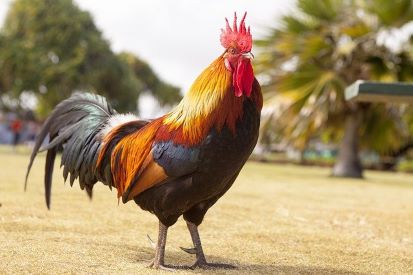
Chickens are omnivorous creatures, meaning they enjoy a varied diet of plants and animals. A healthy and balanced diet for chickens includes a variety of fruits, vegetables, grains, protein (such as insects), and water.
Fruits and vegetables
Chickens love pecking at fresh fruits and vegetables, so be sure to include these in their diet. Some of their favorites include watermelon, cantaloupe, grapes, strawberries, carrots, celery, and leafy greens.
Introduce new foods slowly so their digestive system can get used to them. And as always, wash everything thoroughly before feeding it to your chickens.
Grains
Grains should make up a small portion of a chicken’s diet as they are not as easily digestible as other items. However, they provide valuable nutrients such as proteins, vitamins, and minerals.
Good grain options for chickens include oats, barley, wheat, and rice. Avoid feeding your chickens moldy or spoiled grain, as this can make them sick.
Protein (Insects)
As part of their omnivorous diet, chickens also enjoy snacking on crunchy insects such as crickets, grasshoppers, and mealworms. Not only do these little critters provide protein, but they also contain essential fatty acids that are good for a chicken’s skin and feathers.
If you can’t find any insects in your backyard or garden, you can purchase them online or at your local pet store.
Water
Last but not least is water! Like all living creatures, chickens need to drink plenty of water daily to stay hydrated. Ensure their water dish is clean and filled with fresh water daily.
You can supplement their diet with electrolyte-rich water if they are molting or laying eggs heavily.
Can chickens eat honey – final thoughts
So, can chickens eat honey? The answer is yes! As you can see, there are many benefits to feeding your chickens honey. Not only does it taste good, but it also has many health benefits.
Honey is a natural way to boost your chickens’ immune system, clear up respiratory problems, heal wounds and sores, reduce inflammation, and increase energy levels.
Overall, there is no harm in feeding chickens honey. There are several benefits. Just ensure you mix the honey with water first and don’t give them too much, or you might end up attracting bees and other pests to your chicken coop.
So go ahead and give your chicken a little taste of honey. They’ll love you for it.
